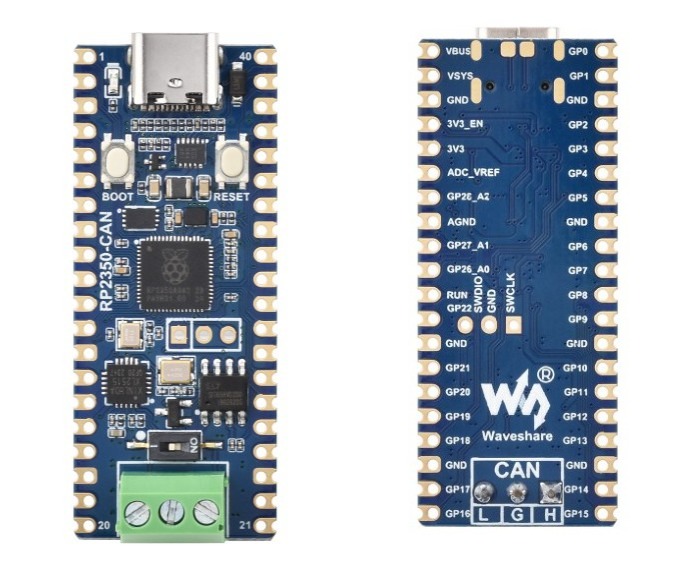
Waveshare Launches $9.99 RP2350-CAN Development Board with Dual-Core MCU and CAN Bus Support
Waveshare has recently launched the RP2350-CAN development board, a Pico-like MCU board based on Raspberry Pi RP2350A SoC with onboard XL2515 CAN Bus controller and a SIT65HVD230DR CAN transceiver. The board supports the CAN V2.0B protocol specification with a communication rate up to 1 Mbps, and the XL2515 chip appears to be a clone of the popular Microchip MCP2515 CAN controller.
Based on the Raspberry Pi RP2350A microcontroller, featuring a unique dual-core, dual-architecture design with an Arm Cortex-M33 processor and a Hazard3 RISC-V processor, running at up to 150MHz, the RP2350-CAN development board includes the same 26 multi-function GPIO pins and USB-C port as found on the Raspberry Pi Pico 2. Other features include a DC-DC buck-boost converter (MP28164), Drag-and-drop programming using mass storage over USB Type-C 1.1, a selectable 120Ω CAN termination resistor, and CAN screw terminals. The CAN Bus board targets automotive, industrial control, and robotics applications.
Waveshare RP2350-CAN Development Board specifications:
- SoC: Raspberry Pi RP2350A
- Dual-core Arm Cortex-M33 @ 150MHz with TrustZone and Secure Boot
- Dual-core RISC-V Hazard3 @ 150MHz
- Memory: 520KB on-chip SRAM
- Storage: 4MB NOR Flash (P25Q32SH-UXH-IR)
- USB:
- USB Type-C for power and programming
- USB 1.1 host/device support
- CAN bus:
- Xinluda XL2515 CAN controller
- SIT65HVD230 CAN transceiver
- Supports CAN 2.0B up to 1 Mbps
- 120Ω terminal resistor switch
- CAN screw terminal
- Expansion:
- 2x 20-pin headers
- 26x multi-function GPIOs
- 2x UART, 2x SPI, 2x I2C
- 16x PWM channels
- 4x ADCs
- 3x PIO blocks, 12x PIO state machines
- Debug: SWD debug interface header
- Miscellaneous:
- Boot and reset buttons
- User LED
- On-chip temperature sensor
- On-chip accurate clock and timers
- Drag-and-drop programming via USB mass storage
- Low-power sleep and dormant modes
- Power supply: 1.8V to 5.5V input with MP28164 DC-DC converter
- Dimentions: 51 x 21mm (Raspberry Pi Pico / Pico 2 compatible)
- Package: QFN-60
In terms of software support, MicroPython, C/C++, and the Arduino IDE are supported, and comprehensive SDKs and resources for easy development are offered. Firmware flashing is possible with Thonny IDE too. More information on how to get started can be found on the wiki.
This isn’t the first time the RP2350A has been used in a development board—it also powers the WeAct Studio RP2350A_V20, Adafruit Feather RP2350, Datanoise PicoADK v2, and others. We also previously covered VoltLog’s CanLite, an ESP32-based CAN Bus development board, though it wasn’t intended as a universal solution due to its limited I/O. Feel free to check it out.
The Waveshare RP2350 CAN development board can be purchased for $9.99 on Waveshare’s official store, for $11.33 on AliExpress, and for $17.99 on Amazon.





















